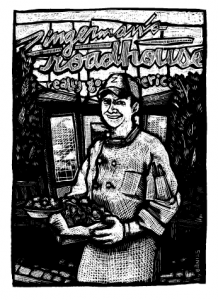The Role of Belief, part one
This essay is an excerpt from Zingerman’s Guide to Good Leading, Volume 3: A Lapsed Anarchist’s Approach to Managing Yourself by Ari Weinzweig (coming in the Fall of 2013). Stay tuned for the next few days to read the whole essay.
 The Role of Belief in Building a Sustainable Business
The Role of Belief in Building a Sustainable Business
Don’t misconstrue my choice of titles—for better or for worse, this is NOT on essay on religion in the workplace. Neither is it about beliefs, as in “values” or “guiding principles,” though those certainly underlie all of what I’m addressing here. Nor is it about politics. It’s about what we—each of us as individuals—believe about the work, people, products and problems we’re engaged with every day. It’s about what we believe to be true—as in “I believe that training is critical to the success of our organization” or, alternatively, “I believe that training is a total waste of time that we tolerate only because corporate says so.” It’s also about approach and framing: “I believe that having employees is the hardest thing about being in business;” Or the inverse, “I believe our people really are a huge asset—the more we involve every- one here in running the better we’re going to do!”
This piece is about how belief plays a really big role in our success—or failure—as individuals. On a bigger scale, how it impacts the health of any organization, how it plays into the quality of the lives of the people who work there, and, (believe it or not) into the quality of the product and service we deliver every day.
My belief in the importance of belief is a fairly recent event in my intellectual development. The concept came into—and stayed in—my mind during a series of long talks, emails and essays with my friend, Anese Cavanaugh. Belief, she insists, is big, and its import is mostly ignored.
As a caveat, let me be clear that none of this stuff about belief is a substitute for sound business practices, great food, good finance, or skilled service work. This is NOT about some supernatural act where you just “believe “and all of a sudden your baguettes get a lot better and everyone who works for you is immediately inspired to perform at championship levels. Instead, I see belief as a modifier, a multiplier. It’s not a substitute for the actual work, but it will amplify whatever else is going on; what you already do well will get better if you believe in it, yourself and your organization.
What you Believe is (Very Often) What you Get
This one’s a bit tricky. I’m not saying it to be all Pollyannaish or anything. Good business planning is obviously based, to a great degree on a real sense of what’s going on. But . . . without losing touch with reality, I have found—through frequent errors on my part—that when I, or others, believe that something is going to be bad . . . it usually will end up being so. I’m not saying that just switching beliefs is enough to turn a terrible economy into a boom, or a bad dishwasher into your next dining room manager. But I really do believe—based on a fair bit of reading, and a lot of years of experience—that it really does make a big difference.
“When people are believing or not believing in something,” Anese went on “they’ll find evidence to support ‘the fact.’ The impact can be huge. Each time what we believed would be bad, turns out to be bad, the culture of negativity grows ever stronger. To quote Rosabeth Moss Kanter, in her excellent book, Confidence: “Instead of believing in positive futures, everyone expects the worst of everyone else—and then acts to make those expectations come true. Self-confidence confidence in one another, and confidence in the system disappear.”
“The way to get past this,” Anese explained, “is to help people be aware of, and responsible for, their beliefs. The belief doesn’t have to be ‘wrong,’ It’s just the art of teaching people to take responsibility for it, challenge it, and get a sense of where their belief is coming from.” That level of awareness—realizing how much one’s often unconscious beliefs are driving decision making and direction—can often be enough to turn things 180 degrees
Energy and Belief
Without question the strength of people’s belief is very closely correlated with the energy we experience when we engage (as customer, coworker, owner or manager) with the organization. First off, the level of energy always follows the level of belief, both up and down. As Anese said, “Belief leads directly to energy—when people believe in what they’re doing, energy amps up, people feel good, value is added to the lives and work of the organization. In negative scenarios, when people just go through the motions and belief is low, the individual and organizational energy both sink quickly.” Secondly, just saying the “right things”
about believing in people or “high quality,” etc. never work well if the energy beneath them, the internal feelings of the person doing the talking and acting, are not authentic. Saying what you’re “supposed to say” without really believing what you’re saying comes across, inevitably, as hollow—energy falls fairly quickly, and belief falters soon thereafter.
Experience Builds Belief
The (unfair perhaps) reality of the world is that the organizations with the long-term track records of success are more likely to attract successful people, folks who believe in themselves, in the organization, and in the value of the work. Which, of course, increases the odds of those organization being even more successful in the future, which in turn attracts better people who believe ever more strongly in the work.
By contrast, getting people to believe in themselves and in the organization when things aren’t going all that well is a hard task. When the people who work in an organization believe that their individual efforts aren’t important and that their input doesn’t make a difference . . . they stop giving it. Productivity slides, good ideas go by the wayside, creativity and quality suffer.
There’s no question that belief builds success which builds belief which builds a culture of success and a positive sense of security, trust and stability. “Continuity,” Rosabeth Moss Kanter write, “breeds faith.” We can increase the odds of this happening by helping people focus on, remember, and learn from their past successes.
Check back tomorrow for Part Two of this essay!




Zingerman’s Art for Sale